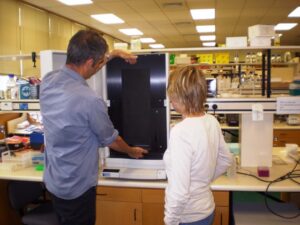Our Global Impact – Funding the Most Promising Stomach Cancer Research
No Stomach For Cancer is dedicated to supporting innovative programs to improve stomach cancer understanding, detection, treatment options, survival rates, and quality of life for stomach cancer patients through direct funding of stomach cancer research and outreach programs.
Grant Opportunities
The No Stomach For Cancer Grant for Gastric Cancer Innovation, Education, and Opportunity is proud to fund research that is essential in leading to a cure for stomach cancer and offers funding to support promising stomach cancer research projects worldwide.
Join our email list to be informed of research funding opportunities.
- Sign up now for our newsletter and stay informed.
- Or text NOSTOMACH4CANCER to 22828 to join our email list.
Grants and Sponsorships Awarded
January 2022
Recipient: Dr. Parry Guilford, University of Otago
Project: Chemoprevention of HDGC
Grant Funding: $84,000
October 2021
Recipient: NCCN Foundation
Project: Patient Guidelines for Stomach Cancer
Sponsorship Funding: $10,000
April 2021
Recipient: Dr. Jeremy Davis, National Cancer Institute
Project: CDH1 loss of heterozygosity in the gastric epithelium is necessary but not sufficient for early diffuse-type gastric carcinogenesis
Grant Funding: $87,000
March 2021
Recipient(s): Joana Figueiredo, Soraia Melo, Patrícia Carneiro, João Miguel Sanches, Fátima Carneiro, Raquel Seruca, Instituto de Investigação e Inovação em Saúde da Universidade do Porto – Associação (i3S)/ IPATIMUP
Project: Project Nice – Nuclear biomarkers for predictive prognosis of hereditary diffuse gastric cancer
Grant Funding: $70,000
June 2020
Recipient: Dr. Parry Guilford, University of Otago
Project: Chemoprevention of HDGC
Grant Funding: $82,000
November 2019
Recipient: Stomach Cancer Awareness Network, d.b.a. Hope for Stomach Cancer
Project: 2nd Annual Stomach Cancer Patient and Caregiver Symposium
Sponsorship Funding: $8,000
May 2019

Recipient: Dr. Parry Guilford, University of Otago
Project: Identification of one or more drugs that can be taken into human clinical trials as chemoprevention compound(s) for HDGC.
Grant Funding: $60,000
Recipient: MD Anderson
Project: Development of a surgical database, peritoneal program, palliative program, and support tool for stomach cancer patients.
Principal Investigators: Paul Mansfield, M.D., Brian Badgwell, M.D., Naruhiko Ikoma, M.D.
Grant Funding: $89,000
Recipient: The National Comprehensive Cancer Foundation (NCCN)
Project: Translate the Patient Guidelines for Stomach Cancer into Japanese, Korean, and Chinese.
Grant Funding: $17,000
Recipient: ClinGen
Project: Expand the ClinVar database of CDH1 gene mutation variants.
Grant Funding: $41,000
Recipient: Dr. Alex Boussioutas, University of Melbourne, Australia
Project: Investigate the role of SFRP4 in gastric cancer.
Grant Funding: $25,000
November 2018
Recipient: NCCN Foundation
Project: Patient Guidelines for Stomach Cancer – Spanish Translation
Sponsorship Funding: $2,300
July 2018
Recipient: Dr. Parry Guilford, University of Otago
Project: IGCLC HDGC Guidelines Meeting 2019, Wanaka, Aotearoa, New Zealand
Sponsorship Funding: $20,000
July 2018
Recipient: Stomach Cancer Foundation of Canada, d.b.a. My Gut Feeling
Project: 2nd Annual Conference on Stomach Cancer
Sponsorship Funding: $5,000
July 2017, July 2018
Recipient: Peter MacCallum Cancer Centre
Project: Using a blood biomarker PredictR to predict the early recurrence of Gastric Cancer
Principal Investigators: Alex Boussioutas, MBBS, Ph.D., FRACP, Dr. Rita Busuttil
Grant Funding: $75,000
June 2017
Recipient: Dana-Farber Cancer Institute
Project: Enhancing Immunotherapy for Gastric Cancer
Principal Investigators: Dr. Adam Bass, Leonie DeKlerk, Dr. Yang Liu
Grant Funding: $50,000
May 2015, August 2017
Recipient: Institute of Molecular Pathology and Immunology of the University of Porto, Portugal (IPATIMUP)
Project: Today’s present, tomorrow’s future on the study of germline E-cadherin missense mutations.
When an individual is tested for a gene mutation relating to stomach cancer, the results are not always conclusive. The Institute provides a service that further analyzes these tests to obtain a more definitive answer regarding germline E – cadherin gene mutations. No Stomach For Cancer has provided funding for this vital project since 2015 – helping these individuals to receive more accurate testing results to make the best choices for their future.
Principal Investigators: Raquel Seruca MD Ph.D., IPATIMUP, Joana Peredes Ph.D., IPATIMUP, and Joao Sanches Ph.D., Institute for Systems and Robotics, LARSys, Instituto Superior Tecnico, University of Lisbon, Portugal
Grant Funding: $60,000
READ THE PROJECT UPDATE | PRESS RELEASE
July 15, 2014
Recipient: University of British Columbia, Vancouver, British Columbia, Canada
Project: Defining the contribution of mutations in CDH1 non-coding regions and other known susceptibility genes to hereditary gastric cancer
Principal Investigators: Dr. David Huntsman, BC Cancer Agency, Vancouver, British Columbia, Canada, and Dr. Carla Oliveira, IPATIMUP, University of Porto, Porto, Portugal. Collaboration and Partnership with the International Gastric Cancer Linkage Consortium (IGCLC).
Grant Funding: $50,000
July 15, 2014
Recipient: University of California, Davis
Project: Gastric cancer gene identification through haplotype analysis and sequencing
Principal Investigator: Dr. Luis Carvajal Carmona, UC Davis Genome Center, Davis, California
Grant Funding: $50,000
May 16, 2013
Recipient: Centre for Translational Cancer Research, University of Otago, Dunedin, NZ
Project: The identification of new drugs for the treatment and prevention of diffuse gastric cancer using a high throughput compound screening approach
Principal Investigator: Dr. Parry Guilford, University of Otago, Dunedin, New Zealand
Grant Funding: $20,000
December 26, 2012
Recipient: Centre for Translational Cancer Research, University of Otago, Dunedin, NZ
Project: Genetic Predisposition to Gastric Cancer
An open-ended project with a commitment to incremental funding dependent upon progress and developments.
Principal Investigator: Dr. Parry Guilford, University of Otago, Dunedin, New Zealand
Grant Funding: $10,000